My courses on scientific publishing help participants to write a manuscript for a scientific journal without the usual hassle and to successfully survive the peer review process. In contrast to other courses on scientific writing, I teach participants how to „publish scientifically“; all participants work on their own manuscript: This course is about the practice of publishing in a peer reviewed journal and not about theory or anecdotes.
Tim Albert’s metaphor „Winning the publications game“ reflects the basic understanding of this course, which is why I also teach the tactics of publishing.
Writing a journal article and getting it published is a successful course concept by Tim Albert for scientific publishing. Parts of my course are based on this course concept.
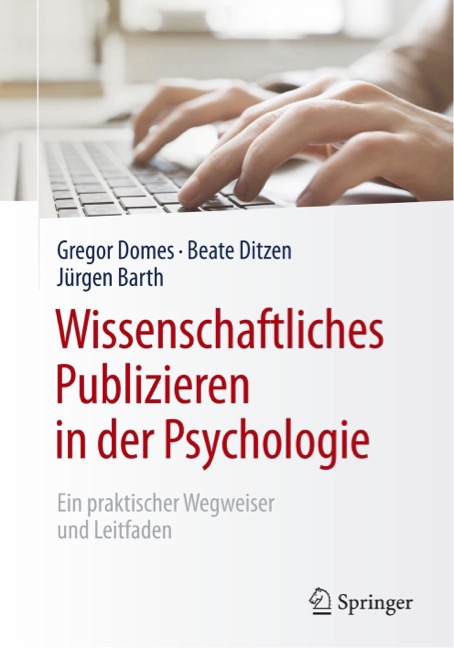
About me: PD Dr. Jürgen Barth
I have been a certified Tim Albert Training trainer since 2010 and offer this course exclusively in German-speaking countries. Over 100 courses have already been held. Trained as a psychologist, I have published over 150 articles myself. In addition, I have many years of expertise as a scientist (currently at the University of Zurich) and supervisor of researchers. From first hand personal experience, I know all the phases of a publication and I publish many scientific articles every year. Important content of my course is presented in my book „Wissenschaftliches Publizieren in der Psychologie: Ein praktischer Wegweiser und Leitfaden“.
Where does my academic publishing course take place?
Institutes or other institutions can book the course for their employees. After some theoretical introductions, all participants work on their manuscript and can support each other in an institution. The course explicitly provides peer support. This also means that open courses are not planned. My courses are and have been regularly booked by the following institutions. Please ask them for a reference.
Switzerland
- Bern: Graduate School for Health Sciences (Kontakt: Tullia Padovani); Berner Fachhochschule Gesundheit (Kontakt Prof. Sabine Hahn)
- Fribourg: Institut für Psychologie (Kontakt: Prof. Simone Munsch, Prof. Nadine Messerli-Bürgy)
- Geneve: Swiss Center of Expertise in Life Course Research
- Lausanne: Université Lausanne, Sciences infirmières (Prof. Anne-Sylvie Ramelet)
- Luzern: Faculty of Health Science and Medicine (Prof. Gisela Michel)
- Zürich: PhD Program Care and Rehabilitation (Prof. Dr. Claudia Witt), PhD Program Clinical Sciences (Prof. Bea Latal), Institut für Epidemiologie, Biostatistik und Prävention (Prof. Dr. Leonhard Held)
Germany
- Frankfurt: Institut für Allgemeinmedizin (Dr. Monika Sennekamp, Dr. Corina Güthlin)
- Freiburg: Sektion Versorgungsforschung und Rehabilitationsforschung (Prof. Erik Farin)
- Heidelberg: Institut für Medizinische Psychologie (Prof. Beate Ditzen)
- Mainz: Klinik für Psychiatrie und Psychotherapie (Prof. Klaus Lieb)
Austria
- Graz: Institut für Allgemeinmedizin und Evidenzbasierte Versorgungsforschung (Prof. Andrea Siebenhofer-Kroitzsch)
- Wien: Austrian Institute for Health Technology Assessment (PD Dr. Claudia Wild)
The course concept
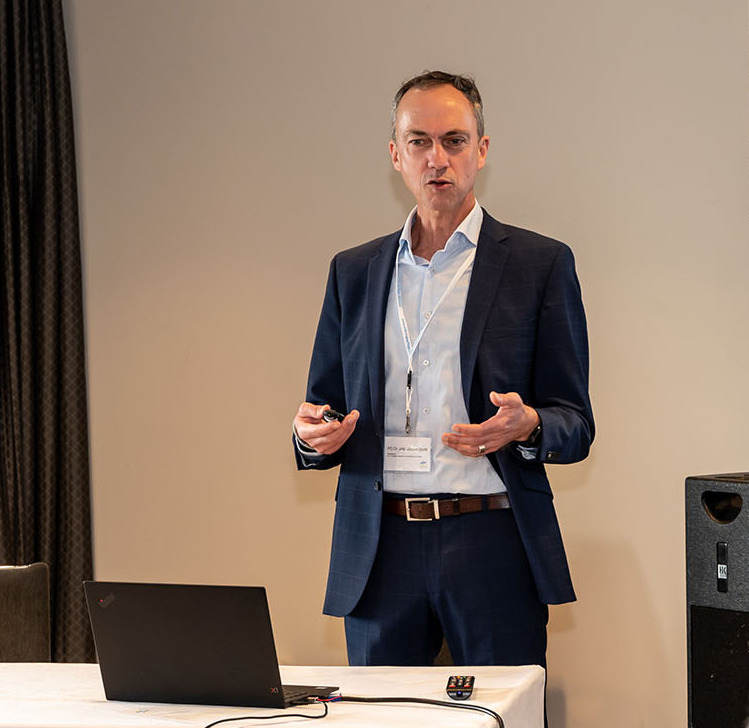
The course concept includes three important strategies:
Understanding the publishing game: Journals need manuscripts, researchers need manuscripts. A good starting point! Strategies for selecting a journal and communicating with the Editor are discussed.
Practice: Complex information from a project must be reduced and transferred into the format of a journal publication. In the course you learn to communicate only the essence and to reduce to essential content. In the course the content is always about the participant’s own manuscript.
Discussing and exchanging ideas with others: The exchange takes place bilaterally with me as the course instructor, but also between participants. Internal peer review helps enormously to shape the writing so that other people can understand it. This doesn’t require any knowledge of the content, just logical thinking and a benevolent atmosphere, as in this course.
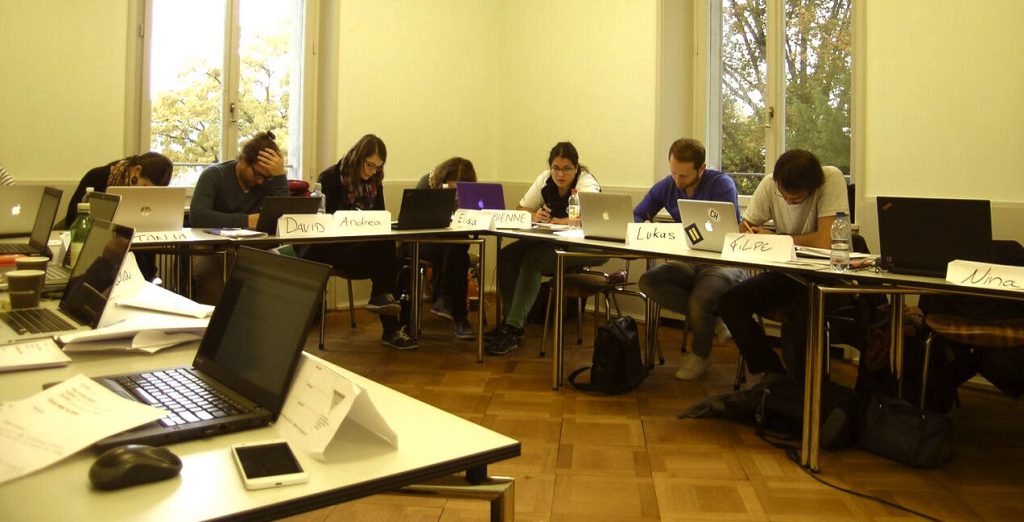
The topics
1) How does the publishing game work and which people are involved?
2) Which journal (target journal) should I choose?
3) What is the central message of my article?
4) What goes in the article and what goes in the appendix?
5) How can I write a first draft?
6) What techniques can I use to efficiently revise my draft?
7) How can I create interesting tables and graphics?
8) Who is a co-author and which of the co-authors will take on which role?
9) What should my cover letter to the editor look like?
10) How do I deal with comments in peer review and how do I get my manuscript accepted?
Target groups
Doctoral students, PhD students, graduate schools, scientific institutes from medicine, psychology, public health, life science and related scientific fields. The only requirement for participants is a concrete idea for a manuscript.
Winning the publication game – what participants say
„Dr. Barth was quick to meet me where I was in the development of my academic writing, and gave me the tools and advice I needed to take the next steps. I was particularly pleased with the writing day retreat—what a great way to jump-start a manuscript.”
Francesca Schmitt (Health Science)
„This is a real hands-on course: Instead of talking about scientific writing, we actually worked on our manuscripts during the course sessions! With lots of practical tips, Jürgen guided us through all stages of manuscript preparation – from drafting individual sections to the final assembling of text, tables, and figures. And it didn’t stop there. Jürgen also coached us on the intricacies of the publications process, giving insight into journal selection, writing a letter to the editor, and how to handle revisions.”
Aurélie Pahud de Mortanges (Neuroscience)
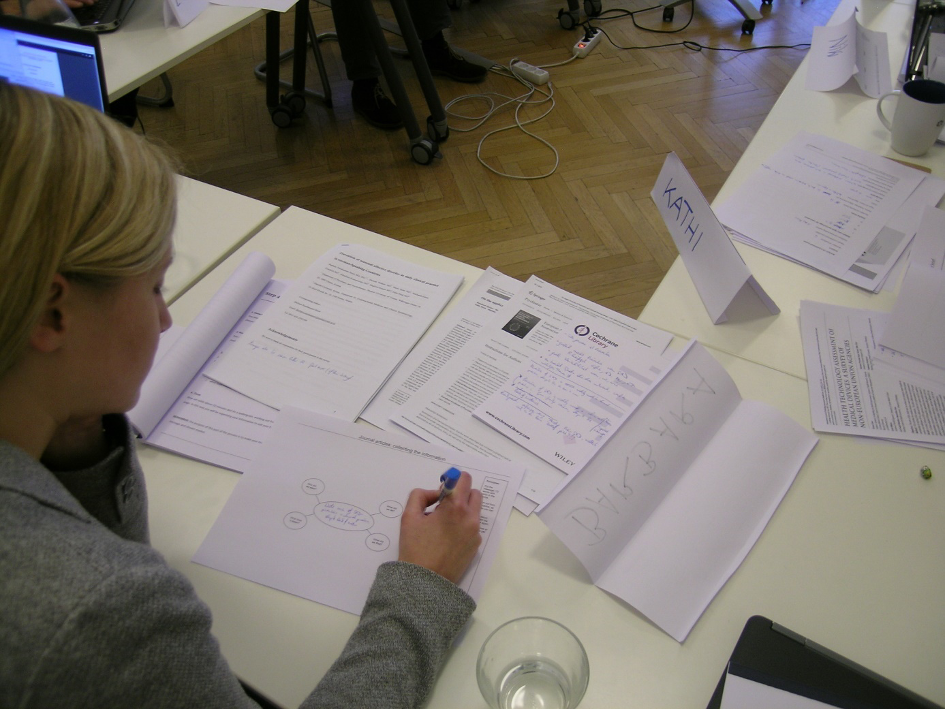
What is special about this course compared to other courses?
All course participants are active! We don’t talk about publishing, we write in the course in order to then publish this manuscript.
All participants work on their own manuscript! It’s not about theoretical exercises, it’s about making a direct profit from your own material.
The course is very interactive! Questions are very welcome and often help to clarify issues with other participants. Experiences can be shared openly and there is a very supportive atmosphere.
The course is pragmatic! It’s not about the perfect sentence, the best graphics, the greatest title. It’s about the sentence that works, the graphics that are understandable and an informative title for the manuscript. A lot can still change in the peer review – too much perfection at the beginning blocks!
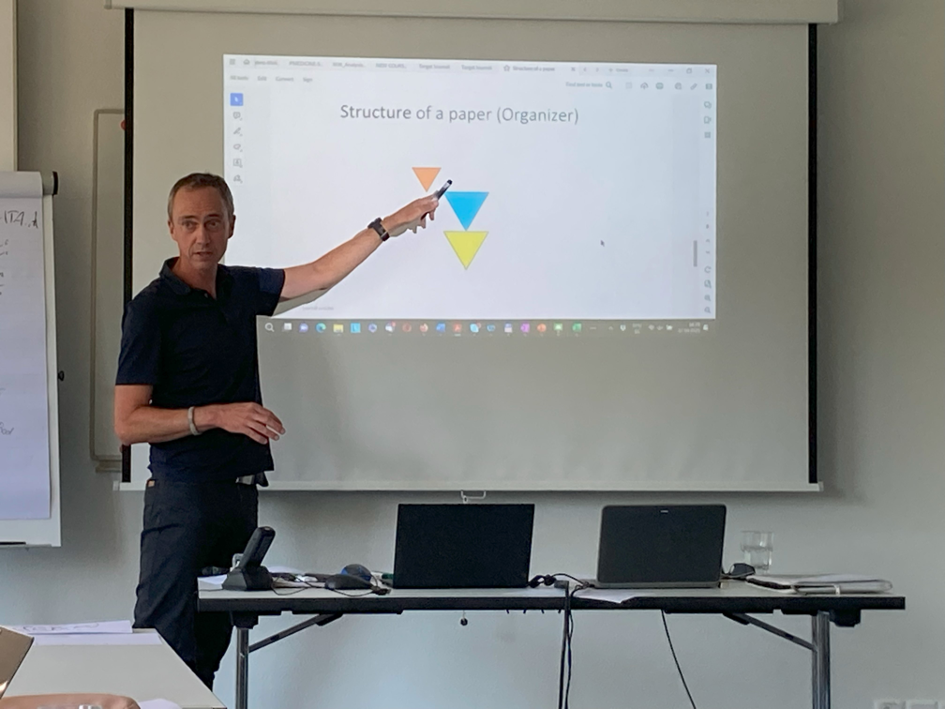
How does the course work?
The course language is German or English, the courses take place at your premises or online. Here you can see the typical structure of both formats:
Normal 2 day course
Day 1 (9.00 to 17.00 including lunch break)
Know the game
Know yourself
Setting a brief
Sort your material
Make a plan
Day 2 (9.00 to 17.00 including lunch break)
Writing the first draft
Rewriting your draft
Prepare the additional elements
Use internal reviewers
Send off the package and respond to reviewers
The fee is usually CHF 1.800 per day. If you are only interested in a one-day course, please contact me.
Continuous online course over 6 months
I offer a total of 6 units over a period of 6 months. First, there will be two three-hour sessions with presentations and exercises (know the game, know yourself, setting a brief, sort your material, make a plan). These sessions serve as preparation for the online writing retreat on the third date. At the online writing retreat, all participants work on their own material in breakout rooms. The online retreat starts at 9 a.m. with a check-in and a goal formulation of each participant for the day. All participants then work individually from home and are in the respective breakout rooms until 5 pm in the evening. There is a short individual coaching session with all participants about 4 times a day. Progress is often very good, as blockages are resolved and the coaching provides quick answers. This is followed by another three-hour session on revision strategies, submission questions and finalizing the first draft. In a second online retreat, further text sections are generated and the aim is to have the entire manuscript and all other sections completed after 6 months. In a final three-hour meeting, the cover letter, dealing with reviewer comments and the final steps up to printing are discussed.
Which format suits my institution?
Face-to-face courses have the advantage of a high level of networking between people who may be on the same course but have had little contact with each other. Writing can also be networking and structures can be formed that are also used after the course (e.g. publication tandems or informal meetings). Face-to-face courses require rooms and participants who can also be on site. The fee is CHF 1.800 per day and the costs for rooms and infrastructure are covered by the institution.
Online courses offer the advantage of high flexibility for participants who may work in different locations. Online courses alternate between impulse lectures, group work and individual work. All course content is shared via an internet platform and can therefore also be exchanged between participants. In addition, breakout rooms are used to enable participants to engage in guided internal exchange. The writing retreats allow for individual feedback, which is rated as very helpful. The fee for online courses is also CHF 1.800 per day.
What other formats are available?
Individual counseling is useful if there are no current offers from the institution providing support and there is a lot of pressure to act. After clarifying the assignment, customers receive an offer with a cost ceiling. Counseling appointments are charged at CHF 100.